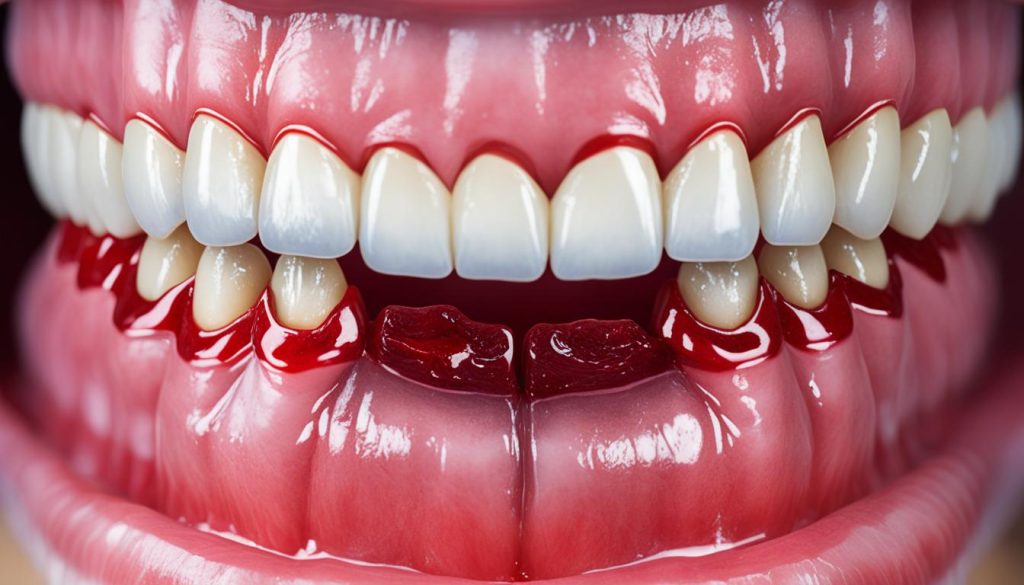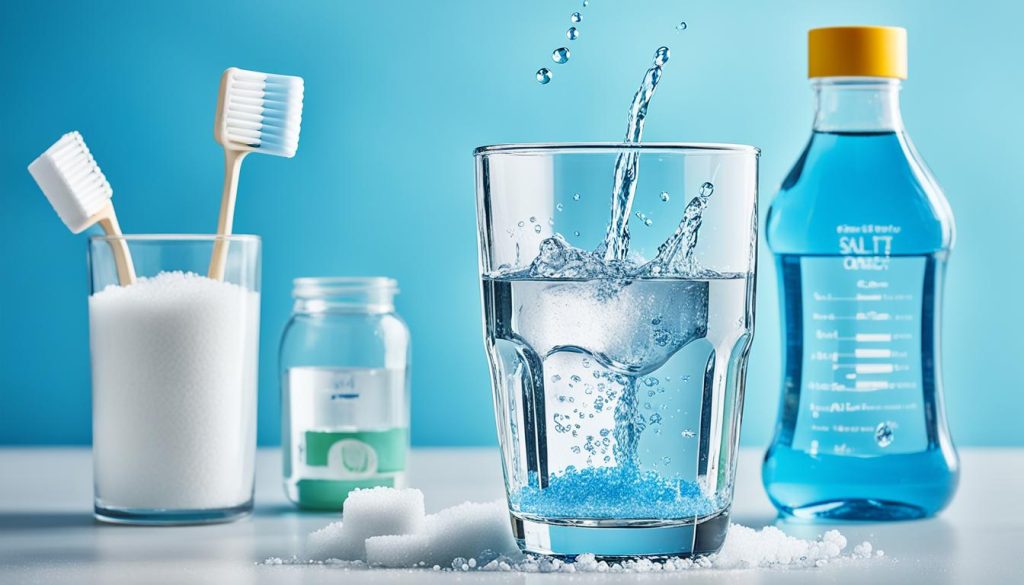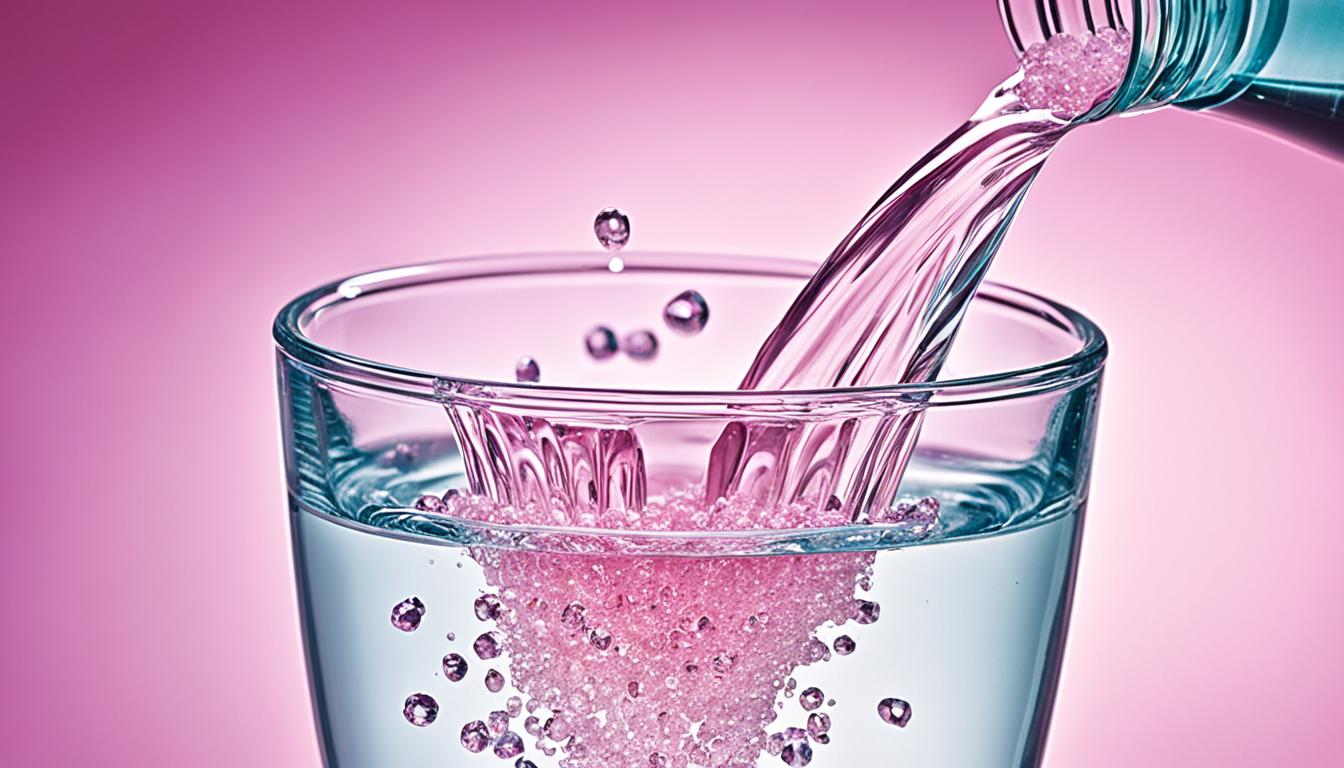Are you searching for a natural remedy to heal your gums? Look no further than your kitchen cabinet – salt water! This simple DIY solution is gaining popularity as a home remedy for gum health. But how long does it really take for salt water to heal gums? Let’s explore the healing properties of salt water and the optimal gum healing time.
Signs and Symptoms of Gum Disease
Gum disease, also known as periodontal disease, can manifest through several signs and symptoms. Recognizing these warning signs is crucial for early detection and prompt treatment, preventing further complications. Here are some common signs to watch out for:
- Bleeding gums: One of the earliest signs of gum disease is bleeding gums, especially during brushing or flossing. If you notice blood on your toothbrush or dental floss, it is essential to consult a dentist.
- Receding gums: As gum disease progresses, the gums may start to recede or pull away from the teeth, creating a noticeable gap. Receding gums can expose the tooth roots and lead to sensitivity and increased vulnerability to decay.
- Bad breath: Persistent bad breath, also known as halitosis, can be a sign of advanced gum disease. The foul odor is caused by the buildup of bacteria in the mouth and pockets between the gums and teeth.
- Tender and swollen gums: Inflamed gums that appear red, tender, or swollen are common indicators of gum disease. Healthy gums should have a pinkish color and feel firm to the touch.
- Shifting or loose teeth: As gum disease progresses, the supporting tissues and bone structure around the teeth can weaken, causing the teeth to become loose or shift. Difficulty in biting or chewing may also be experienced.
- Deep pockets between gums and teeth: Gum disease can cause the formation of deep pockets or gaps between the gums and teeth. These pockets trap food particles and bacteria, further exacerbating the condition.
If you are experiencing any of these signs and symptoms, it is important to schedule an appointment with your dentist. Early intervention and proper treatment can help prevent the progression of gum disease and maintain optimal oral health.

Is It Safe to Rinse with Salt Water Every Day?
Gargling with salt water is a popular home remedy for oral health concerns, including gum disease. However, it’s important to consider the frequency of salt water rinses to ensure the safety and effectiveness of this practice.
Daily salt water gargles should be approached with caution, as they can potentially have negative effects on tooth enamel and gum health.
The salt in the water can soften tooth enamel, making it more vulnerable to damage. Additionally, frequent use of salt water rinses may also irritate the gums, leading to possible inflammation and discomfort.
It’s especially crucial for individuals with high blood pressure to be mindful of their salt water rinse frequency. Excessive salt intake can potentially exacerbate high blood pressure, so it’s advisable to explore alternative options for maintaining oral health.
While salt water rinses can provide temporary relief and aid in the healing process for certain oral health issues, it’s best to use them as directed by a dental professional and not as a daily gargling routine.
Consulting with your dentist or oral healthcare provider will ensure that you receive personalized advice based on your specific oral health needs and concerns.

How to Make Salt Water for Gums?
When it comes to maintaining gum health, a saltwater rinse can be a simple yet effective solution. Creating a saltwater rinse for your gums is easy and can be done in just a few simple steps.
- Start by using warm water. Warm water helps dissolve the salt and allows for better penetration.
- Add one teaspoon of salt to the warm water. The salt acts as a natural antiseptic and helps reduce bacteria in the mouth.
- If desired, you can consider adding additional ingredients for added benefits. For example, hydrogen peroxide can help kill bacteria and alleviate inflammation, while honey can provide soothing properties. However, it is important to note that these additional ingredients should be used sparingly and under the guidance of a dental professional.
- Once you have mixed the solution, allow it to cool to a comfortable temperature. Rinsing with warm salt water can help soothe gums and alleviate discomfort.
- When ready, take a small sip of the saltwater rinse and swish it around your mouth for about 30 seconds. Be sure to focus on the areas affected by gum issues.
- After swishing, spit out the solution and avoid swallowing it. Rinse your mouth with plain water to remove any residual salt.
- It is important to note that any leftover saltwater solution should be discarded after each use. This helps prevent contamination and ensures the freshness and effectiveness of each rinse.
Incorporating a saltwater rinse into your oral hygiene routine can help promote gum health and provide relief from gum-related issues. However, it’s always best to consult with a dental professional for personalized guidance and advice.

Benefits of Using Salt Water for Gum Health
Saltwater rinses provide several benefits for gum health. By utilizing the healing properties of salt water, individuals can promote gum therapy and improve overall oral well-being. Let’s explore the numerous advantages of incorporating salt water into your dental routine.
1. Inhibits Bacterial Growth
Salt water has been found to effectively inhibit the growth of bacteria in the mouth. This can help reduce the risk of gum disease and other oral health issues caused by harmful bacteria. By incorporating salt water rinses into your daily oral care routine, you can create a healthier oral environment.
2. Reduces Dental Plaque and Oral Microbial Count
Regular use of salt water rinses has been shown to reduce dental plaque and control the oral microbial count. This can help prevent the buildup of plaque, which is a major contributor to gum disease and tooth decay. By maintaining a lower microbial count, you can promote gum health and prevent oral health problems.
3. Creates an Alkaline Oral Environment
An alkaline oral environment is less favorable for harmful bacteria to thrive. Salt water contributes to the alkalinity of the mouth, making it harder for bacteria to flourish. By using salt water as a part of your gum therapy routine, you can create an environment that is more inhospitable to harmful bacteria, reducing the risk of gum disease.
4. Aids in the Healing Process
Salt water rinses can be particularly beneficial for aiding in the healing process after dental procedures. The healing properties of salt water help soothe gum tissues and promote faster healing. Whether you’ve undergone a tooth extraction or other dental treatments, salt water can provide a natural and accessible way to support the healing process.
5. Provides Respiratory Health Benefits
In addition to its benefits for gum health, salt water can also provide respiratory health benefits. Gargling with salt water can help relieve throat irritation and reduce symptoms of respiratory infections, such as cough and congestion. It serves as a natural remedy for respiratory discomfort, promoting overall well-being.
Overall, salt water is an accessible and effective home remedy for maintaining gum health. By incorporating salt water rinses into your oral care routine, you can enjoy the benefits of salt water gum therapy and promote healthy gums and a healthier overall oral environment.

Treating Gingivitis with Salt Water
Gingivitis, the early stage of gum disease, can be effectively treated with the use of saltwater rinses. Gargling with salt water two or three times a day can provide numerous benefits for gum health and aid in the healing process.
By rinsing with salt water, you can help heal inflamed gum tissues and reduce bacteria in the mouth. The salt water rinse works by removing food particles and debris that may be contributing to gum inflammation. Additionally, the antimicrobial properties of salt water can help alleviate bad breath, a common symptom of gingivitis.
To make a saltwater rinse, simply mix ½ to ¾ teaspoon of table salt with a small glass of lukewarm water. Swish the solution in your mouth for about 30 seconds before spitting it out and brushing your teeth. It is crucial to ensure that the solution is not too hot or too cold, as extreme temperatures can cause discomfort.
In addition to saltwater rinses, thorough dental cleanings and the use of a dentist-recommended mouthwash can further aid in treating gingivitis. Regular dental check-ups and cleanings are essential to monitor the progress of your gum health and address any underlying issues. Your dentist will be able to provide personalized recommendations and guidance for your specific condition.
Incorporating saltwater rinses into your oral hygiene routine, along with professional dental care, can effectively treat gingivitis and promote gum health. However, it is important to note that if your symptoms persist or worsen, it is advised to seek professional dental advice and treatment. Your dentist will be able to assess the severity of your condition and develop a personalized treatment plan to address your specific needs.
Timeline for Treating Gingivitis
Compliance with dental recommendations can lead to significant improvement in gingivitis within two to three weeks. This timeline may vary depending on the severity of the condition. For more severe cases, it may take a longer healing time to see noticeable results.
Thorough dental cleanings by a professional can remove plaque and tartar buildup, which are major contributors to gum disease. These cleanings, along with regular brushing and flossing at home, are vital for treating gingivitis and preventing its progression.
In addition to dental cleanings, adding saltwater rinses as part of your oral hygiene routine can further help manage and treat gingivitis. Gargling with a saltwater solution helps reduce bacteria, soothes inflamed gum tissues, and aids in the healing process. Advanced mouthwashes specifically formulated for gingivitis treatment can also be beneficial.




